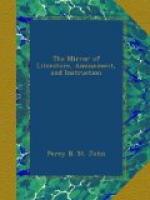The common road from Blacknest (the name of this district of Windsor Forest) to the Royal Lodge is strikingly beautiful. Virginia Water is crossed by a very elegant bridge, built by Sandby; on one side of it the view terminates in a toy of the last age—a Chinese temple; on the other it ranges over a broad expanse of water. The road sometimes reminds one of the wildness of mountain scenery, and at another turn displays all the fertility of a peaceful agricultural district. We at length pass the secluded domain of the Royal Lodge; and when we reach the edge of the hill, we look upon a vista of the most magnificent elms, and over an expanse of the most striking forest scenery, with the splendid Castle terminating the prospect—a monument of past glories, which those who have a feeling for their country’s honour may well uphold and cherish.— London Magazine.
* * * * *
SPIRIT OF THE PUBLIC JOURNALS.
TEA.
The principal article of our commerce with China, namely, tea, is, perhaps, more singular in its history than any other article of commerce in the known world. A simple and unsophisticated shrub, in little more than half a century, has become an article of such general consumption, that it seems to form one of the prime articles of existence among the great bulk of mankind. It is the peculiar growth of a country, of which it forms almost the only link of connexion with the rest of the world. It forms the source of the largest commercial revenue to the British Government of any other commodity whatever, and of the largest commercial profits to the individuals concerned in its importation. Withal, it is the simplest, the most harmless thing that ever was offered to the gratification of man,—having, it is believed and argued by many, a moral influence wherever it is diffused. It is the rallying point of our earliest associations; it has ever given an additional charm to our firesides; and tends, perhaps, more than any one thing, to confirm the pre-existing domestic habits of the British public. Its exhilarating qualities are eagerly sought after as a restorative and solace from the effects of fatigue or dissipation; the healthy and the sick, the young and the old, all equally resort to the use of it, as yielding all the salutary influence of strong liquors, without their baneful and pernicious effects. Yet this shrub, so simple and so useful, is delivered to the community of this country, so surcharged with duties and profits beyond its original cost, that, did it contain all the mischievous qualities that are opposed to its real virtues, it could not be more strictly guarded from general use.
For the whole of our imports, including factory expenses and commission, the original cost in China amounts to the sum of two millions sterling. This is wonderfully increased before the British public can have any access to the article of consumption; thus:—




